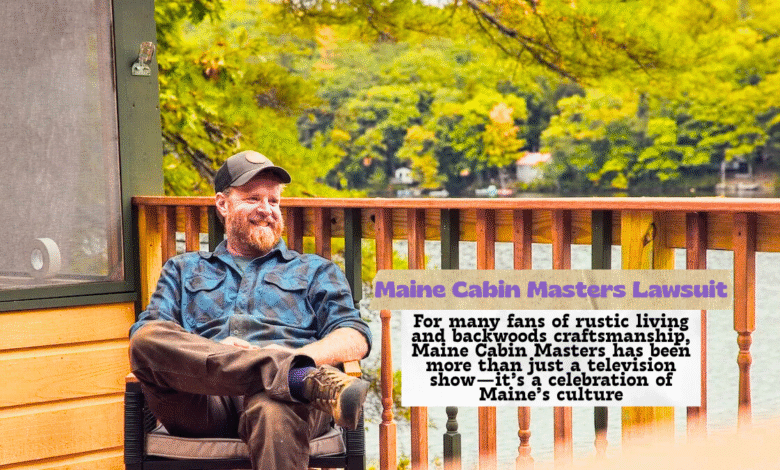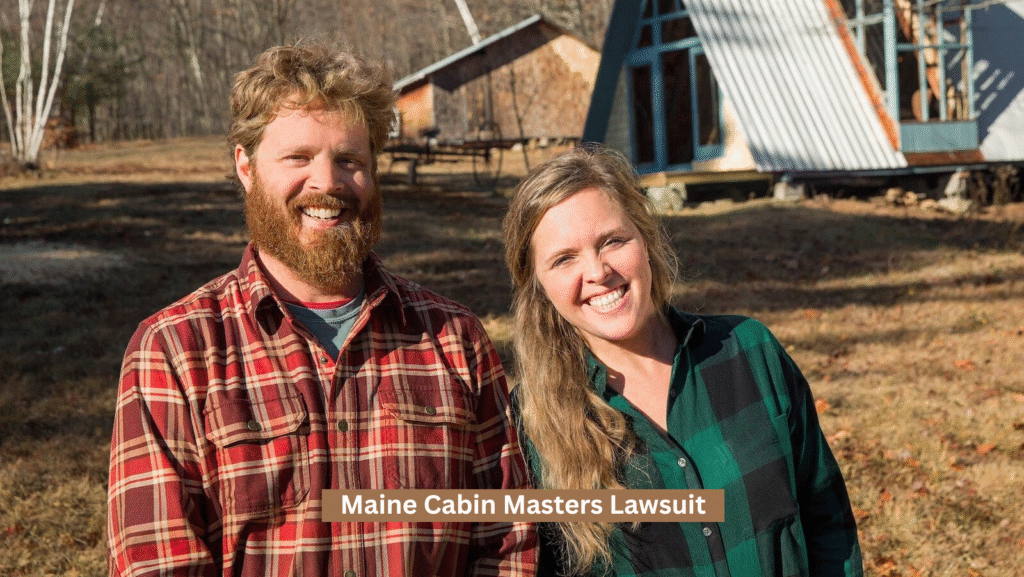Maine Cabin Masters Lawsuit What Really Happened Behind the Popular Show

For many fans of rustic living and backwoods craftsmanship, Maine Cabin Masters has been more than just a television show—it’s a celebration of Maine’s culture, resourcefulness, and beauty. The series, which airs on Magnolia Network (formerly DIY Network), follows a close-knit crew of builders led by Chase Morrill as they restore and rebuild neglected cabins throughout the pine forests of Maine. However, in 2022, this beloved show found itself under public scrutiny when the Environmental Protection Agency (EPA) announced a legal settlement with the company behind the series. The news shocked viewers who had come to love the easygoing energy of the show’s hosts and their passion for craftsmanship.
The so-called Maine Cabin Masters lawsuit was not a dramatic courtroom showdown but a legal settlement that carried serious implications. It raised questions about environmental safety, regulatory oversight, and the responsibilities that come with being in the public eye. For fans, it also offered a reminder that even the most down-to-earth TV builders must abide by the same laws that apply to every contractor across America.
The Background of Maine Cabin Masters
Maine Cabin Masters first aired in 2017 and quickly became a hit for its authenticity and charm. The show features Chase Morrill, his sister Ashley Morrill Eldridge, her husband Ryan Eldridge, and their longtime friends Matt Dix and Jared “Jedi” Baker. Together, they run a family-operated business called Kennebec Cabin Company, located in Manchester, Maine.
What set the show apart from other renovation programs was its simplicity. The crew wasn’t remodeling mansions or city apartments—they were rebuilding old hunting lodges, lake cabins, and family camps that often hadn’t seen repairs in decades. The episodes celebrated Maine’s local trades, traditions, and humor. Viewers connected with the crew’s camaraderie and the state’s rustic charm.
Over time, the show became a significant part of the Magnolia Network lineup, drawing millions of viewers nationwide. But behind the laughter and lumber was a legal issue brewing quietly that would later come to light.
How the Lawsuit Started
The lawsuit began when the EPA investigated Kennebec Property Services, LLC, the company that manages the renovation work for the show. According to EPA findings, the business had conducted renovations on five residential properties built before 1978, a year that matters because that’s when lead-based paint was banned for residential use in the United States.
During these renovations, the EPA alleged, the company failed to follow several critical lead safety protocols outlined in the Lead Renovation, Repair, and Painting (RRP) Rule. The rule requires contractors to take specific precautions when disturbing old paint that could contain lead, including proper certification, safe work practices, and homeowner education.
The EPA found that the Maine Cabin Masters’ company:
- Did not renew or maintain proper certification as an RRP firm.
- Failed to assign a certified renovator for each job site.
- Did not provide homeowners with EPA-approved pamphlets warning about lead hazards.
- Failed to keep complete compliance records.
These might seem like technical violations, but they matter deeply. Lead exposure—especially from old paint dust—can be harmful, particularly to children, causing neurological damage and developmental delays. The EPA took the violations seriously, noting that TV renovation shows have a unique influence on public behavior.
Maine Cabin Masters Cast Bio Table
| Name | Role on Show | Date of Birth | Age (2025) | Height | Net Worth | Family | Social Media |
|---|---|---|---|---|---|---|---|
| Chase Morrill | Lead Contractor | Dec 25, 1977 | 47 | 5’10” | $600,000 | Married, children | Instagram: @chasemorrill |
| Ashley Morrill Eldridge | Designer & Co-Host | Jan 27, 1976 | 49 | 5’8″ | $460,000 | Married to Ryan Eldridge | Instagram: @ashley_maine_cabin_masters |
| Ryan Eldridge | Builder & Co-Host | ~1974 | 51 | 6’0″ | $400,000 | Married to Ashley | Not publicly active |
| Matt Dix | Carpenter & Crew Member | Unknown | – | – | – | – | – |
| Jared “Jedi” Baker | Carpenter & Crew Member | Unknown | – | – | – | – | – |

The Legal Settlement and Its Consequences
In October 2022, the EPA and Kennebec Property Services reached a settlement rather than pursuing a drawn-out court battle. Under the agreement, the company paid a civil penalty of $16,500 and pledged to take several corrective actions. More importantly, they agreed to use their national platform to educate the public.
The company promised to:
- Obtain proper certification under the RRP rule.
- Follow strict compliance for all future renovation work.
- Include information about lead-safe renovation practices in three episodes of Maine Cabin Masters and one episode of their podcast, “From the Woodshed.”
This educational requirement was a first of its kind in the home renovation television world. Instead of merely paying a fine, the show’s creators would help raise awareness about lead safety through their popular media channels.
The EPA stated that “television shows that demonstrate home remodeling have a special responsibility to model lead-safe work practices and help their viewers understand how to protect their families.” It was a message that resonated not only with fans of the show but with anyone who follows DIY or renovation content.
Why This Case Matters
The Maine Cabin Masters lawsuit was not about deceit or fraud—it was about oversight and responsibility. The show’s cast were not villains; they were busy builders balancing production deadlines, budgets, and back-to-back projects. Still, the case reminded everyone that even the most well-meaning professionals must follow safety laws that protect both workers and homeowners.
It also brought to light a broader issue: the influence of media on real-world practices. When people watch television contractors rip out old walls and sand old paint, they often assume those practices are safe. The reality is different. Lead dust from older structures can linger and cause long-term health problems. The EPA used this case to emphasize the importance of modeling proper safety practices on-screen, not just off-screen.
The Show’s Response and Reforms
To their credit, the Maine Cabin Masters team took responsibility quickly and publicly. After the settlement, they obtained the necessary EPA certifications, updated their internal procedures, and worked to ensure their renovations followed all federal guidelines. They also followed through on their commitment to educate viewers.
Chase Morrill and his team used their platform to talk about safe renovation methods, emphasizing that being environmentally responsible is part of being a professional builder. Fans appreciated their transparency, and the show’s reputation largely remained intact. The crew’s humility and willingness to learn turned what could have been a major PR problem into a teachable moment.
Who Are the Maine Cabin Masters?
To understand the human side of the story, it helps to know more about the people behind the show. Each member of the team brings a unique skill set and personality that has made Maine Cabin Masters such a success.
Chase Morrill was born on December 25, 1977, in Augusta, Maine. At around 47 years old in 2025, he remains the heart of the operation—a builder through and through, with a background in construction and an easygoing sense of humor. Chase stands about 5 feet 10 inches tall, and his approachable personality has made him a fan favorite. His estimated net worth is around $600,000, much of which comes from his business and television work. He’s married with children and lives a modest life in Maine, true to his roots.
Ashley Morrill Eldridge, Chase’s sister, is the creative mind behind the show’s interior design. Born in 1976, she’s around 49 years old. Ashley brings warmth and artistry to each project, transforming rugged cabins into cozy retreats. She’s married to Ryan Eldridge, another key member of the crew, and together they bring a blend of humor and skill that fans love. Ashley’s net worth is estimated at $460,000, and she maintains an active presence on social media, where fans follow her design tips and behind-the-scenes glimpses.
Ryan Eldridge, Ashley’s husband, is known for his pragmatic approach to building and his signature dry wit. Born in the mid-1970s, Ryan is in his late 40s, standing at about 6 feet tall, and has an estimated net worth of $400,000. He’s the perfect counterpart to Ashley’s creativity and Chase’s leadership, rounding out the family dynamic that gives the show its chemistry.
Matt Dix and Jared “Jedi” Baker are longtime friends of the Morrills. Both are skilled builders who’ve been part of the crew since the beginning. They embody Maine’s working-class spirit—hardworking, resourceful, and grounded.
Together, this group has become more than a TV crew—they’re local celebrities, small business owners, and ambassadors for Maine craftsmanship.
Life After the Settlement
Following the EPA settlement, Maine Cabin Masters continued to thrive. The controversy faded, replaced by a renewed commitment to transparency and professionalism. The show’s later seasons featured subtle nods to safety—viewers could see protective gear, plastic containment barriers, and discussions about lead safety woven naturally into the storytelling.
The team also used their Kennebec Cabin Company headquarters to promote environmentally responsible building practices. They expanded their merchandise, hosted events, and even opened a retail shop and pub that became a tourist destination for fans traveling through Maine.
Far from damaging their reputation, the incident humanized the crew. Viewers saw that even skilled professionals can make mistakes—but what matters is how they respond to them.
What Homeowners Can Learn from This
If there’s one lesson to take away from the Maine Cabin Masters lawsuit, it’s that safety and compliance are just as important as creativity and craftsmanship. For homeowners planning renovations—especially on older properties—the EPA’s RRP rule should be taken seriously. Always ensure your contractors are certified, that they provide lead safety information, and that they follow proper cleanup procedures.
The case also shows how influential TV can be. Viewers who watch renovation shows often feel inspired to tackle their own projects, but they might not realize the unseen safety measures that should be in place. The EPA’s decision to make Maine Cabin Masters a public example ultimately helped spread awareness nationwide.
Conclusion: Lessons from the Woods
The Maine Cabin Masters lawsuit was never about malice—it was about accountability. The team behind the show made a mistake. owned it, and turned it into a positive step forward. Today, the series continues to represent the values that first drew fans in: family, craftsmanship, honesty, and community.
By cooperating with the EPA, the crew showed integrity and a willingness to learn. Their actions turned a regulatory setback into a public good—educating millions of viewers about the importance of lead safety.
Ultimately, Maine Cabin Masters remains not only a beloved television series but also a reminder that even the most seasoned builders are still students of their craft. The woods of Maine are full of lessons—and sometimes, the most valuable ones come not from a perfect build, but from the humility to do better the next time.
FAQs
What is the Maine Cabin Masters lawsuit about?
The Maine Cabin Masters lawsuit involved EPA allegations that the show’s renovation company violated federal lead safety rules. The Maine Cabin Masters lawsuit resulted in a settlement and public education agreement on safe renovation practices.
2. When did the Maine Cabin Masters lawsuit happen?
The Maine Cabin Masters lawsuit was settled in October 2022 after an EPA investigation. The Maine Cabin Masters lawsuit centered on renovation work completed in 2020 that didn’t meet lead compliance standards.
3. Who was responsible in the Maine Cabin Masters lawsuit?
Kennebec Property Services LLC, the company behind the show, was named in the Maine Cabin Masters lawsuit. The Maine Cabin Masters lawsuit held the firm accountable rather than the individual TV personalities.
4. What was the outcome of the Maine Cabin Masters lawsuit?
The Maine Cabin Masters lawsuit ended with a $16,500 fine and a commitment to follow EPA lead-safe rules. The Maine Cabin Masters lawsuit also required the team to include lead-safety education in future episodes.
5. How did fans react to the Maine Cabin Masters lawsuit?
Most viewers saw the Maine Cabin Masters lawsuit as a learning moment for the show and industry. The Maine Cabin Masters lawsuit didn’t harm the crew’s reputation, as they handled it responsibly and transparently.





